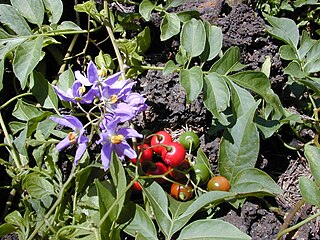
Solanum is a large and diverse genus of flowering plants, which include three food crops of high economic importance: the potato, the tomato and the eggplant. It is the largest genus in the nightshade family Solanaceae, comprising around 1,500 species. It also contains the so-called horse nettles, as well as numerous plants cultivated for their ornamental flowers and fruit.
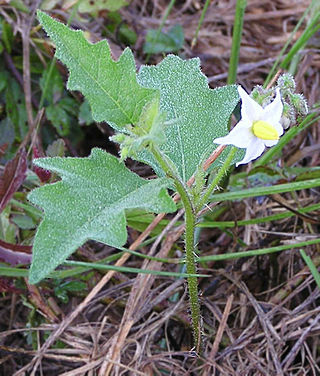
Solanum carolinense, the Carolina horsenettle, is not a true nettle, but a member of the Solanaceae, or nightshade family. It is a perennial herbaceous plant, native to the southeastern United States, though its range has expanded throughout much of temperate North America. The plant is an invasive in parts of Europe, Asia, and Australia. The stem and undersides of larger leaf veins are covered with prickles.

Solanum mauritianum is a small tree or shrub native to South America, including Northern Argentina, Southern Brazil, Paraguay and Uruguay. Its common names include earleaf nightshade, woolly nightshade, flannel weed, bugweed, tobacco weed, tobacco bush, wild tobacco and kerosene plant.
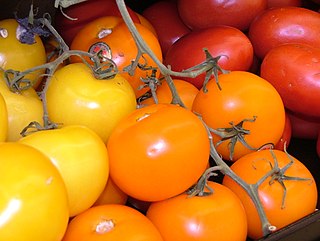
Lycopersicon was a genus in the flowering plant family Solanaceae. It contained about 13 species in the tomato group of nightshades. First removed from the genus Solanum by Philip Miller in 1754, its removal leaves the latter genus paraphyletic, so modern botanists generally accept the names in Solanum. The name Lycopersicon is still used by gardeners, farmers, and seed companies. Collectively, the species in this group apart from the common cultivated plant are called wild tomatoes.
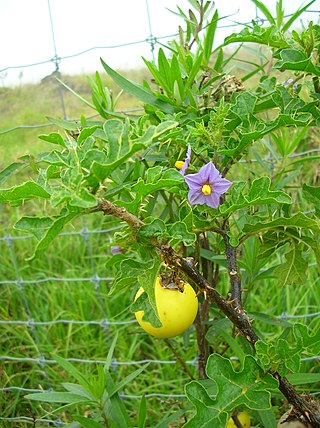
Solanum linnaeanum is a nightshade species known as devil's apple and, in some places where it is introduced, apple of Sodom. The latter name is also used for other nightshades and entirely different plants elsewhere, in particular the poisonous milkweed Calotropis procera.

Solanum ellipticum is known as potato bush and under the more ambiguous name of "bush tomato". The Arrernte name of merne awele-awele might refer to this species or to the similar S. quadriloculatum. Native to Australia, the potato bush is a small fruiting shrub in the family Solanaceae.

Lycianthes is a genus of plants from the nightshade family (Solanaceae), found in both the Old World and the New World, but predominantly in the latter. It contains roughly 150 species, mostly from tropical America, with 35-40 species in Asia and the Pacific.

Solanum capsicoides, the cockroach berry, known as polohauai'i in Polynesia, is a flowering plant in the family Solanaceae. It is native to eastern Brazil but naturalized in other tropical regions, where it sometimes becomes an invasive weed.
Solanum pseudoquina is a species of plant in the family Solanaceae. It is endemic to Brazil. A rare plant, it is dependent on conservation of its habitat to prevent it from becoming a threatened species.

Solanum citrullifolium is a species of flowering plant in the Solanaceae family. It is a nightshade referred to by the common name watermelon nightshade, as its leaves somewhat resemble those of a watermelon plant. It is a white-stemmed shrub with purple star-shaped flowers. It is native to the southern United States and it is grown in home gardens as an ornamental plant.

Solanum chippendalei is a small fruiting shrub in the family Solanaceae, native to northern Australia. It is named after its discoverer, George Chippendale. The fruits, known as "bush tomatoes", are edible and are an important indigenous food, and the aborigines who use them broadcast the seed for later harvesting.
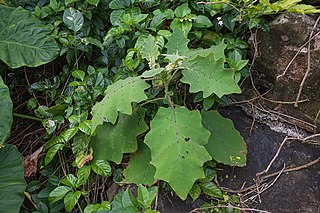
Solanum lasiocarpum, synonym Solanum feroxL., otherwise known as Indian nightshade or hairy-fruited eggplant, is a plant that produces edible fruit. Its flowers are white and its fruits are pale yellow.
Solanum cowiei is a small fruiting subshrub in the family Solanaceae. It is endemic to the Northern Territory in Australia. The fruit is a green berry, up to 15 mm in diameter, that later becomes black-green and detaches from the calyx.

Leucinodes cordalis, the poroporo fruit borer or eggfruit caterpillar, is a species of moth in the family Crambidae. It is found in New Zealand, Australia and Indonesia (Sulawesi). In Australia, it has been reported from Norfolk Island, the Northern Territory, Queensland, New South Wales, the Australian Capital Territory, Victoria, Tasmania and South Australia. The species was first described by Henry Doubleday in 1843.

The Solanaceae, or the nightshades, are a family of flowering plants that ranges from annual and perennial herbs to vines, lianas, epiphytes, shrubs, and trees, and includes a number of agricultural crops, medicinal plants, spices, weeds, and ornamentals. Many members of the family contain potent alkaloids, and some are highly toxic, but many—including tomatoes, potatoes, eggplant, bell and chili peppers—are used as food. The family belongs to the order Solanales, in the asterid group and class Magnoliopsida (dicotyledons). The Solanaceae consists of about 98 genera and some 2,700 species, with a great diversity of habitats, morphology and ecology.

Solanum conocarpum, commonly known as marron bacoba, is a vascular plant species in the family Solanaceae found in the US Virgin Islands and British Virgin Islands.
Solanum peruvianum is a species of wild tomato in the family Solanaceae. It is native to the Galápagos Islands, Ecuador, Peru, and northern Chile, and has been introduced to California. Some authorities consider it to be a member of a species complex, with the other members being Solanum corneliomuelleri, Solanum huaylasense, and Solanum arcanum.

Solanum sturtianum, commonly known as Thargomindah nightshade, is a flowering plant in the family Solanaceae. It is an upright shrub with grey-green leaves and purple flowers. This species is endemic to Australia.

Solanum scalarium, known as the Garrarnawun bush tomato, is a species of plant native to the Garrarnawun Lookout in Judbarra/Gregory National Park, Australia. The species was first collected in 2018, and was formally described by botanists Christopher Martine and Tanisha Williams in 2022.
Solanum lucani is a species of flowering plant in the family Solanaceae, native to seasonally dry areas of northern Australia. It is a sprawling annual that does well in disturbed areas.















